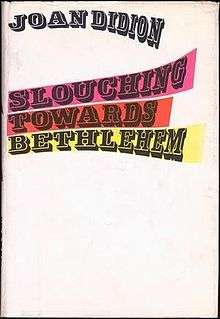Slouching Towards Bethlehem
 First edition | |
| Author | Joan Didion |
|---|---|
| Country | United States |
| Language | English |
| Publisher | Farrar, Straus and Giroux |
Publication date | 1968 |
| Media type | Print (Hardback and paperback) |
| Pages | 238 |
| OCLC | 22634186 |
Slouching Towards Bethlehem is a 1968 collection of essays by Joan Didion that mainly describes her experiences in California during the 1960s. It takes its title from the poem "The Second Coming", by W. B. Yeats. The contents of this book are reprinted in Didion's We Tell Ourselves Stories in Order to Live: Collected Nonfiction (2006).
Title essay
The title essay describes Didion's impressions of the Haight-Ashbury district of San Francisco during the neighborhood's heyday as a countercultural center. In contrast to the more utopian image of the milieu promoted by counterculture sympathizers then and now, Didion offered a rather grim portrayal of the goings-on, including an encounter with a pre-school-age child who was given LSD by her parents.
In her preface to the book, Didion writes, "I went to San Francisco because I had not been able to work in some months, had been paralyzed by the conviction that writing was an irrelevant act, that the world as I had understood it no longer existed. If I was to work again at all, it would be necessary for me to come to terms with disorder."[1]
Contents
I. Lifestyles in the Golden Land
- "Some Dreamers of the Golden Dream"
Appeared first in 1966 in The Saturday Evening Post under the title "How Can I Tell Them There's Nothing Left". - "John Wayne: A Love Song"
Appeared first in 1965 in The Saturday Evening Post. - "Where the Kissing Never Stops"
Appeared first in 1966 in The New York Times Magazine under the title "Just Folks at a School for Non-Violence". - "Comrade Laski, C.P.U.S.A. (M.-L.)"
Appeared first in 1967 in The Saturday Evening Post. - "7000 Romaine, Los Angeles 38"
Appeared first in 1967 in The Saturday Evening Post under the title "The Howard Hughes Underground". - "California Dreaming"
Appeared first in 1967 in The Saturday Evening Post. - "Marrying Absurd"
Appeared first in 1967 in The Saturday Evening Post. - "Slouching Towards Bethlehem"
Appeared first in 1967 in The Saturday Evening Post.
II. Personals
- "On Keeping a Notebook"
Appeared first in 1966 in Holiday. - "On Self-Respect"
Appeared first in 1961 in Vogue. - "I Can't Get That Monster out of My Mind"
Appeared first in 1964 in The American Scholar. - "On Morality"
Appeared first in 1965 in The American Scholar under the title "The Insidious Ethic of Conscience". - "On Going Home"
Appeared first in 1967 in The Saturday Evening Post.
III. Seven Places of the Mind
- "Notes from a Native Daughter"
Appeared first in 1965 in Holiday. - "Letter from Paradise, 21° 19' N., 157° 52' W"
Appeared first in 1966 in The Saturday Evening Post under the title "Hawaii: Taps Over Pearl Harbor". - "Rock of Ages"
Appeared first in 1967 in The Saturday Evening Post. - "The Seacoast of Despair"
Appeared first in 1967 in The Saturday Evening Post. - "Guaymas, Sonora"
Appeared first in 1965 in Vogue. - "Los Angeles Notebook"
A section entitled "The Santa Ana" appeared first in 1965 in The Saturday Evening Post. - "Goodbye to All That"
Appeared first in 1967 in The Saturday Evening Post under the title "Farewell to the Enchanted City".
Reception
In The New York Times Book Review, the novelist and screenwriter Dan Wakefield wrote, "Didion's first collection of nonfiction writing, Slouching Towards Bethlehem, brings together some of the finest magazine pieces published by anyone in this country in recent years. Now that Truman Capote has pronounced that such work may achieve the stature of 'art,' perhaps it is possible for this collection to be recognized as it should be: not as a better or worse example of what some people call 'mere journalism,' but as a rich display of some of the best prose written today in this country."[2]
References
- ↑ Joan Didion, Slouching Towards Bethlehem, New York: Farrar, Straus and Giroux, 1968. p. xiii.
- ↑ Dan Wakefield, "Places, People and Personalities," The New York Times Book Review, June 21, 1968.